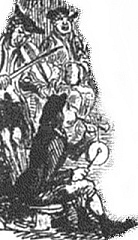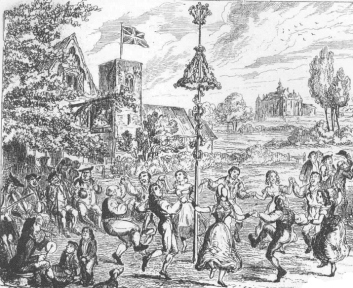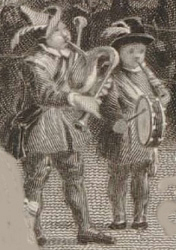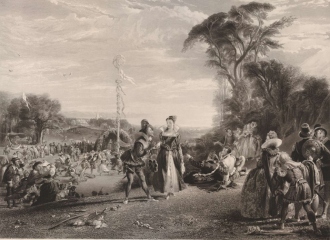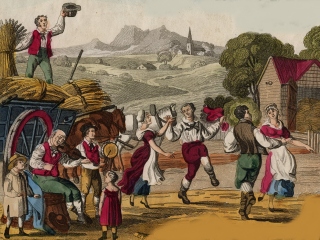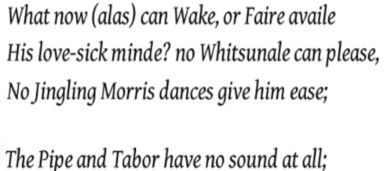.......
1859 newspaper report  Northern Daily Times - Saturday 28 May 1859 Northern Daily Times - Saturday 28 May 1859 |
| |
|
May Day
"Hertfordshire has a long tradition of celebrating May Day ... The traditional
celebrations started
very early in the
morning,
before dawn, when groups
of young people, usually accompanied by
musicians playing instruments
such
as
the pipe and tabor, would
gather to collect branches
of may
(hawthorn) from local woodlands." |
|
1826 May Queen story  Maria Edgeworth Maria Edgeworth |
1844 children's story 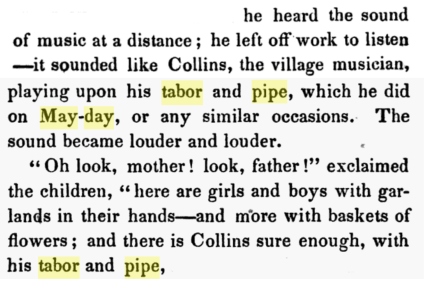 The Gift for All Seasons: A Juvenile Annual page 94 The Gift for All Seasons: A Juvenile Annual page 94 |
1845 procession The Christian mother's magazine, ed. by Mrs. Milner
Volume 2 page 286 The Christian mother's magazine, ed. by Mrs. Milner
Volume 2 page 286 |
1846   Bentley's Miscellany
Volume 19 page 557 Bentley's Miscellany
Volume 19 page 557 |
1849 poem in newspaper describing collecting flowers early on May morning:
“…Even this morning—no longer ago,
I saw a shoal of shepherds out go,
With singing, anl shouting, and jolly cheer ;
Before them went a lusty tabourer,
That unto many a hornpipe play’d
Whereto they danced, each one with his maid….”
‘Illustrated London Almanack’ Vol. 5 1849, page 23 |
1855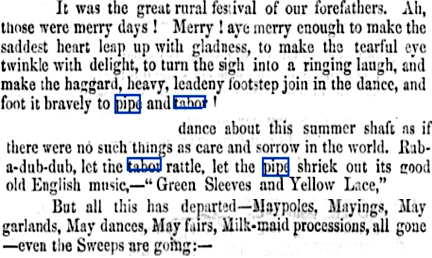 Lady's Newspaper and Pictorial Times - Saturday 28 April 1855 Lady's Newspaper and Pictorial Times - Saturday 28 April 1855 |
1860 ‘The Month May’ advertisement from John Barren Merchant Tailor and General Outfitter’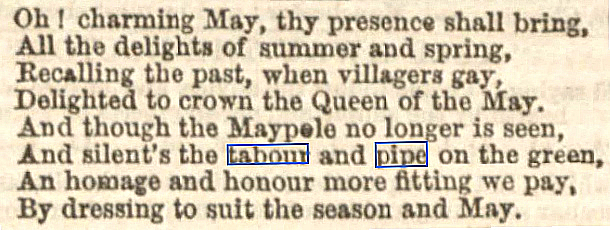 Leeds Times - Saturday 12 May 1860 Leeds Times - Saturday 12 May 1860 |
1860 poem
‘The Queen of the May’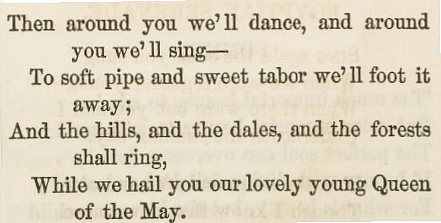 ‘The household book of poetry’ by Dana, Charles A. ‘The household book of poetry’ by Dana, Charles A. |
1862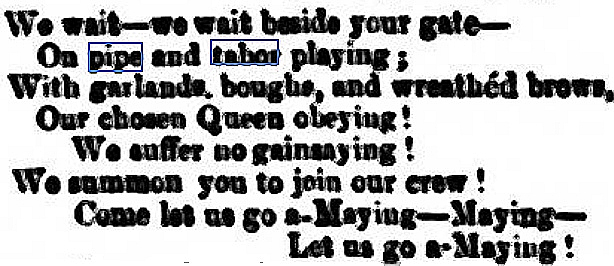 |
1860's poem
‘May Day Songs’ by WC Bennett:
"Your fathers met the May,
With laughter, dance, and tabor;
Come, be as wise as they:
Come steal today from labour...
Talk not of want of leisure;
Believe me, life was made,
For laughter, mirth and pleasure,
Far more than toil and trade"
'May Day In South London: a history'
by Neil Transpontine |
1867 Mayday procession the the olden time (detail) 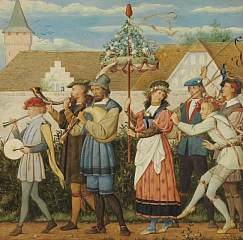 |
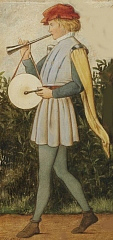 1867 taborer leads the procession 1867 taborer leads the procession |
|
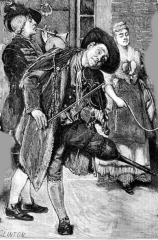 1872 milkmaids procession, "The Milkmaids' May Day in Olden Time" London;
pipe and tabor with fiddler 1872 milkmaids procession, "The Milkmaids' May Day in Olden Time" London;
pipe and tabor with fiddler
(The Graphic) |
1880 newspaper report:  The Graphic (London, England) Saturday, May 1, 1880; Issue 544. The Graphic (London, England) Saturday, May 1, 1880; Issue 544. |
|
1881 Mayday festival is not celebrated any more:   Baily's Magazine of Sports & Pastimes
Volume 37 page 229 Baily's Magazine of Sports & Pastimes
Volume 37 page 229 |
1888 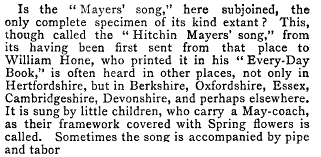 'The Musical Times' 1888, May 1st page 266 'The Musical Times' 1888, May 1st page 266 |
1896 May Day procession
“At Charlton-on-Otmoor, Oxon, on May morning a procession used to start from the vicarage,
headed by two men
carrying a large
garland of flowers on a stick. With them went six morris-dancers,
a fool or " Squire," who carried a
bladder and a money-box,
and
a man who played the pipe and tabour”
'Old English Customs Extant at the Present Time An Account of Local Observances Festival Customs and
Ancient Ceremonies yet Surviving in Great Britain'
by T. H. Titchfield, London, 1896 |
| |
Chimney sweeps procession |
1823, 1 May: The chimney-sweepers as usual paraded the streets, but with more pomp than last year.
In addition to their ordinary finery they had a drum & pipe, &c.
Oxford, Bodleian Library, MS.Eng.hist.c.144. Frederic Madden MSS., 'Journal for 1823', f.86. |
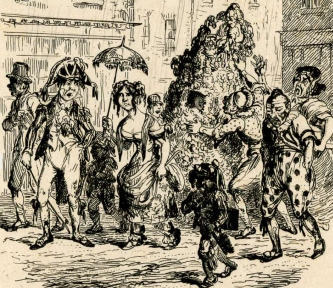 1836 the Lord and Lady are arguing and soaked through due to the heavy rain, the Clown despondantly walks along with his hands in his pockets, the taborer has his drum on his back. 1836 the Lord and Lady are arguing and soaked through due to the heavy rain, the Clown despondantly walks along with his hands in his pockets, the taborer has his drum on his back.
© The Trustees of the British Museum
|
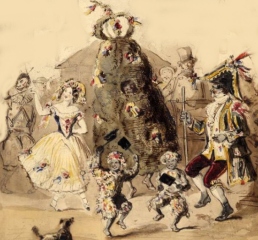 1830-50 1830-50 |
|
1841  Wolverhampton Chronicle and Staffordshire Advertiser - Wednesday 02 June 1841 Wolverhampton Chronicle and Staffordshire Advertiser - Wednesday 02 June 1841 |
1841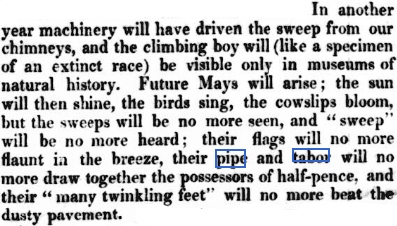 Wolverhampton Chronicle and Staffordshire Advertiser - Wednesday 02 June 1841 Wolverhampton Chronicle and Staffordshire Advertiser - Wednesday 02 June 1841 |
1842 Lambeth, London
Two gentlement "were driving a
spirited horse
past ...
Kennington-
road, when some sweeps,
accompanied
with drums and fifes,
startled the
horse, which became
wholly
unmanageable,
and in a few
seconds dashed the
vehicle
against the iron corner post" |
1849 report in London  Inverness Courier - Thursday 10 May 1849 Inverness Courier - Thursday 10 May 1849
|
|
1844: THE MAY-DAY OF STEAM.
“No longer milkmaids dance along the Strand on May-morning - even the leaves of
Jack-in-the-Green are withered -
and the
chimney-sweepers, who were wont to summon
our half-pence by the rattling broom and shovel, no longer call
on May-day for
the yearly
dole.
True it is,
that imposters, men lost to the sweetness of self-respect, do on May-day
caper
on the streets, and
with ghastly merriment strive to make us smile and pay. But, reader,
put no faith in such forlorn
merry-makers ;
they are not
sweepers. They never made soot
their daily bread"
Punch [almanac] VI (London: Punch, 1844), page 196 |
|
|
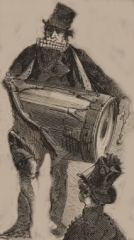 1860 Annual Chimney Sweeps Festival, May 1st London, with pandean pipes 1860 Annual Chimney Sweeps Festival, May 1st London, with pandean pipes |
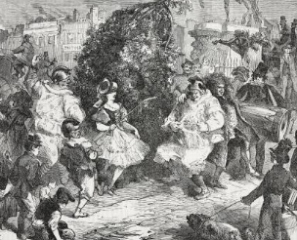 1860 (detail) 1860 (detail) |
|
1861
"The juvenile members of the [sweeps] profession disport themselves in fancy dresses - faded finery
from Drury Lane,
and things
that once were smart from Monmouth Street - and parade the thoroughfares
with drums and fifes ...
To-day, however, in violation
of all the canons of art in such matters, some of the
sweeps set at nought the good
old custom, and actually had the hardihood to
appear in washed faces!" |
By the 1880's the Jack-in-the-Green procession had changed as the sweeps were invited to a formal dinner
rather than
processing
round the streets:
"And on May-morning the deceivers take on the character of sweeps, and dance the unwary out of
halfpence.
As for the real sweeps,
they have advanced in luxury, and dine at Copenhagen-house. They
dance, too, but then
it is to the sounds of hireling minstrels ;
they have become respectable, and have left
the streets to cheats and imposters"
Punch [almanac] VI (London: Punch, 1844), page 196. |
1899 ‘Our London Letter’ Norfolk News - Saturday 06 May 1899 Norfolk News - Saturday 06 May 1899 |
| |
Jack-in-the-Green |
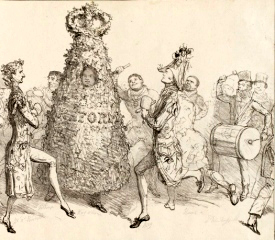 1831 May Day satire 1831 May Day satire
© National Portrait Gallery, London
|
|
|
1836
"The prisoners were dressed up in an eccentric style. Sharpe and Ellis were clowns; Davis [sic] was papered
and spangled
as "My Lord," and Vincent, as "Jack in the Green."
Bird stated that yesterday morning,
about twelve o'clock, prisoners
entered
Bedford-row with a fife and drum, followed by an immense
crowd of persons, when they commenced dancing"
The Morning Post, 4 May 1836, page 4. |
1836
“for some few years ago, the dancing on May-day began to decline; small sweeps were
observed to
congregate in twos or threes, unsupported by a "green," with no *' My Lord"
to act as master of the ceremonies, and no " My Lady*'
to preside over the exchequer.
Even in
companies where there was a green, it was an
absolute nothing — a mere sprout;
and the
instrumental accompaniments rarely extended
beyond the shovels and a set of
Pan-pipes,
better known to the many, as a mouth
organ."
"Sketches by Boz: Illustrative of Every-day Life, and Every-day People, Charles Dickens page 337 |
|
|
|
1881  'All the Year Round' page108 'All the Year Round' page108 |
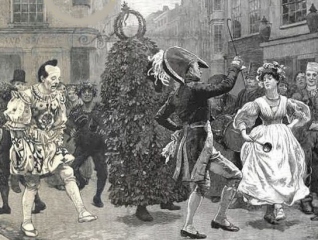 “Jack-in-the-Green – A May Day Scene Sixty Years Ago” by Charles Green “Jack-in-the-Green – A May Day Scene Sixty Years Ago” by Charles Green
The Graphic May 3 1890 |
| |
|
| Maypole dancing |
1829, July 4th (letter addressed To the Editor of the Mirror.)
"Three years ago you .... lamented the decrease of village
festivity and rural merriment, which in days langsyne cheered the honest
hearts and lightened the daily toil of our rustic ancestors. ... the song, the dance, and innocent
revelry are not quite forgotten in some part of our land...I arrived in the village of Shillingston (Dorsetshire),
.....a village fete which I lately witnessed
and enjoyed....the company were just
arriving in procession,
preceded by a pink and white silken banner,
while a pipe and tabor regulated their march. ...
led the party off in
the order they came to witness the ceremony of "dressing" the May-Pole...." |
1830 Sun (London) - Saturday 30 October 1830 Sun (London) - Saturday 30 October 1830 |
1832  The Journal of Health. Conducted by an Association of Physicians 1832-05-09: Vol 3 Iss 17 The Journal of Health. Conducted by an Association of Physicians 1832-05-09: Vol 3 Iss 17 |
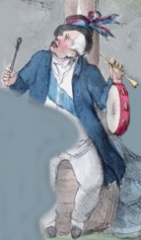 1832 satire, playing for 1832 satire, playing for
maypole dancers |
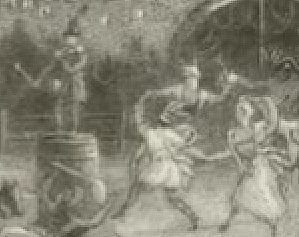 1835 painting (detail) ' May-day, in the Reign of Queen Elizabeth' 1835 painting (detail) ' May-day, in the Reign of Queen Elizabeth' |
|
|
|
|
1837  The Ancient English Morris Dance
by Michael Heaney · 2023 The Ancient English Morris Dance
by Michael Heaney · 2023 |
1841 The Ladies' Garland Volume 4, Issue 11 page 249 The Ladies' Garland Volume 4, Issue 11 page 249 |
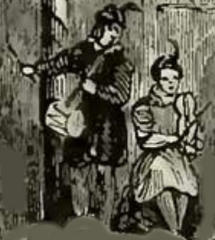 1841 imagined Elizabethan maypole musicians 1841 imagined Elizabethan maypole musicians |
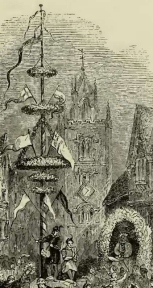 1841 detail from engraving 1841 detail from engraving |
1844 The Betley window image was reproduced again: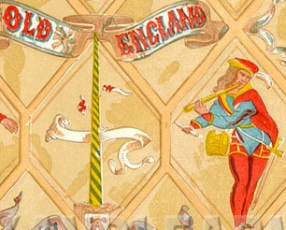 |
|
1844 ‘Young Englandism’ a political essay Liverpool Albion - Monday 17 June 1844 Liverpool Albion - Monday 17 June 1844 |
1845 poem 'The Merrie Times of Old'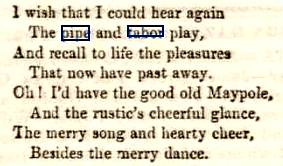 Leamington Spa Courier - Saturday 01 March 1845 Leamington Spa Courier - Saturday 01 March 1845 |
1845 poem 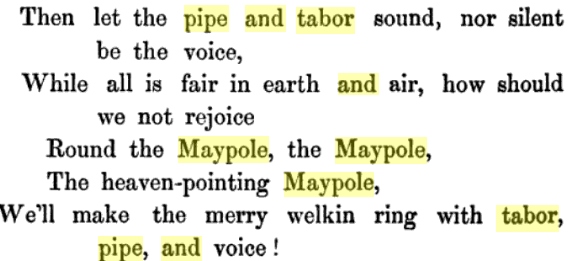 ‘Poems: Scriptural Classical and Miscellaneous’ by Richard Charles Coxe ‘Poems: Scriptural Classical and Miscellaneous’ by Richard Charles Coxe |
1848 ‘The First of May’ Leamington Spa Courier - Saturday 06 May 1848 Leamington Spa Courier - Saturday 06 May 1848 |
1849 ‘Where are the Smiles' by Thomas Vaughan Hereford Journal - Wednesday 09 May 1849 Hereford Journal - Wednesday 09 May 1849 |
1849 “…But time has not preserved even the names of the mazy measures which they danced;
and nearly all we know of the ancient pipe and tabor, the favourite music to which they timed
their footsteps, is gathered from glancing at some scarce engraving….”
‘Illustrated London Almanack’ Vol. 5 1849, page 23 |
1850 story 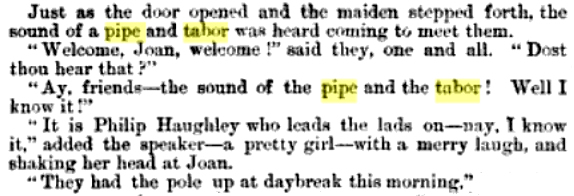 The History and Legends of Old Castles & Abbeys - page 566 The History and Legends of Old Castles & Abbeys - page 566 |
1853 May Day article in the USA 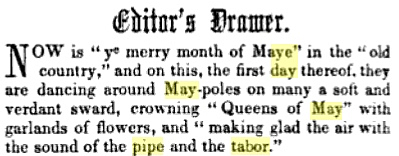 Harper's New Monthly Magazine
Volume 6 page 850 Harper's New Monthly Magazine
Volume 6 page 850 |
1855 painting ' Raising the Maypole' set in Jacobean times 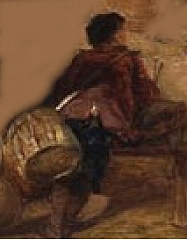 |
1862 review of Oxford Music Hall ‘Jolly Beggers’  Sun (London) - Friday 09 May 1862 Sun (London) - Friday 09 May 1862 |
1863 poem
'ACROSTIC.'
“…Now the shepherds tune their lay
Round the merry maypole high,
And the happy swains so gay
Number 'neath the bright blue sky ;
Send the pipe and tabor round, …”
'Jottings'
by Ransford, Edwin |
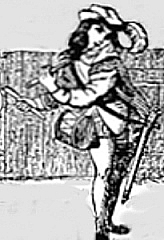 1864 Chamber's Book of Days 1864 Chamber's Book of Days
(more images of this taborer here) |
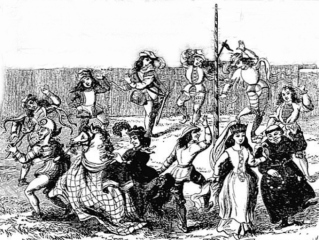 characters dance around the maypole characters dance around the maypole |
|
1872 poem by Fredrick Burrington Western Times - Friday 20 December 1872 Western Times - Friday 20 December 1872
|
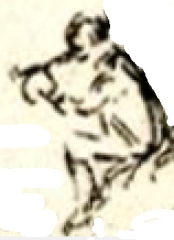 1823-1872 playing for maypole dancing, border print 1823-1872 playing for maypole dancing, border print |
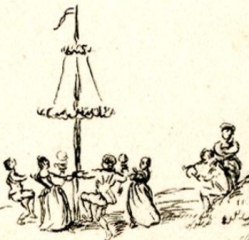 taborer with dancers taborer with dancers |
| |
|
1886 Maypole ‘Fair for a Fund for providing a curate and mission room’ Cheltenham Looker-On - Saturday 11 December 1886 Cheltenham Looker-On - Saturday 11 December 1886 |
1889 Australian newspaper report on May Day ‘Here and There’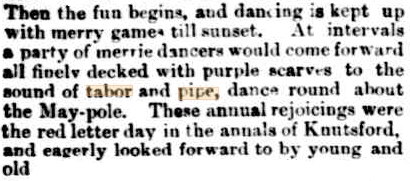 Williamstown Chronicle (Vic. : 1856 - 1954) Saturday 24 August 1889 - Page 3 Williamstown Chronicle (Vic. : 1856 - 1954) Saturday 24 August 1889 - Page 3
|
1889 Floral Fete at the Albert Hall, London  |
1890 A story: ‘Something for Young Folks, a Dream of May Day’ Warminster & Westbury journal, and Wilts County Advertiser - Saturday 03 May 1890 Warminster & Westbury journal, and Wilts County Advertiser - Saturday 03 May 1890 |
| |
|
|
| Harvest Home Procession |
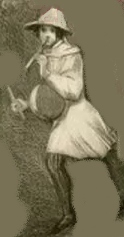 early 19th century, early 19th century,
playing for harvest home |
1836 |
1836 poem 'FLEET STREET ECLOGUES'
“…Of peasants when they bring
The harvest of the earth.
With pipe and tabor hither roam
All ye who love our Harvest-home.
Hurrah for the English yeoman !...”
'Fleet Street Eclogues'
by Davidson, John |
John Prescott Knight (1803-1881) painted the 'Harvest Home Evening' .
The 1837 Liverpool exhibition catalogue described the painting:
"The last load is brought in and stops under the village maypole which has been decorated for the occasion.
The harvest queen advances accompanied by the cheerful pipe and tabor "
New Lyrical Almanack for 1837
|
|
1838 Harvest home:
" Crown'd with the cares of cornc, now come,
And, to the pipe, sing harvest home.
Come forth, my lord, and see the cart,
Drest up with all the country art.
The pipe and the tabor are now busily set awork,
and the lad and the lass will have no lead on their heels.
O, 'tis the merry time,"
The New Monthly Magazine and Humorist,
part 3, ed Theodore Hook, Rural Festivals |
1857 from:" Ballad: THE HAYMAKER'S SONG.
[AN old and very favourite ditty sung in many
parts of England
at
merry-makings, especially
at those which occur during the hay-
harvest. It is not in any collection.]
And when that bright day faded,
And the sun was going down,
There was a merry piper
Approached from the town:
He pulled out his pipe and tabor,
So sweetly he did play,
Which made all lay down their rakes,
And leave off making hay.
Then joining in a dance,
They jig it o'er the green; ..."
Ancient Poems, Ballads and Songs of the Peasantry of England
edited
by Robert Bell,
part 4 |
|
1858 'The Old Water Mill' by John Farmer Borough of Greenwich Free Press - Saturday 12 June 1858 Borough of Greenwich Free Press - Saturday 12 June 1858
|
1859 writing about the 17th century:
"the Harvest Cart, and the garland of flowers crowns the captain of the Reapers : the battle of the field is now stoutly fought. The pipe and the tabor are now busily set a-work ;
and the lad and the lass will have no
lead on their heels...." |
|
|
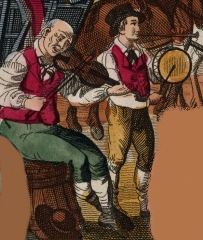 playing for dancers; pipe and tabor with fiddler playing for dancers; pipe and tabor with fiddler |
|
1863 Frant Harvest Home  Surrey Gazette - Tuesday 22 September 1863 Surrey Gazette - Tuesday 22 September 1863 |
1867 Western Gazette - Friday 27 September 1867 Western Gazette - Friday 27 September 1867 |
1869 ' Harvest Home' by E J de Barr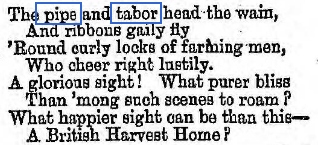 The Ipswich Journal - Saturday 28 August 1869 The Ipswich Journal - Saturday 28 August 1869 |
Sept 24th 1869 Harvest Home:
a procession from the harvest fields
when all the work was done
" while a pipe and tabor went merrily
sounding in front,
and the reapers tripped ..." |
|
1883 Tamworth Herald - Saturday 28 July 1883 Tamworth Herald - Saturday 28 July 1883 |
1891 from the poem 'Tis Harvest Time (Scotland)
"At daylight forth to labour
The healthy peasant hies;
Nor sound of pipe and tabor
Could happier make him rise ..." |
1893 from the poem ‘Michaelmas’
"Of peasants when they bring
The harvest of the earth.
With pipe and tabor hither roam
All ye who love our Harvest-home.
Hurrah for the English yeoman"
Fleet Street eclogues (1893)
Davidson, John |
1895 poem indicates that the pipe and tabor were played whilst the harvest was being collected: "In an old song
picked up in the West of England, these were the music of the haysel dance -
The pipe and tabor both shall play,
The viols loudly ring,
From morn till eve each summer day,
As we go hay-making.”
'English minstrelsie : a national monument of English song'
by Baring-Gould, S. (Sabine) |
Whitson Ale
early Victorian North Leigh, Oxfordshire
|
1827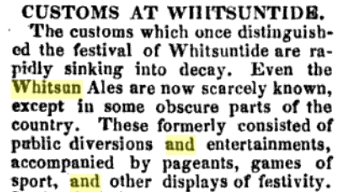 The Mirror - Page 7 The Mirror - Page 7 |
1837 Woodstock Whitsun Ale   Whitsun in 19th century Oxfordshire by Alun Hokins Whitsun in 19th century Oxfordshire by Alun Hokins |
1854 Northamptonshire 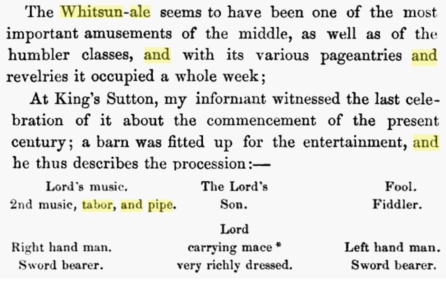 Glossary of Northamptonshire Words and PhrasesAnne Elizabeth Baker · 1854 page 433 Glossary of Northamptonshire Words and PhrasesAnne Elizabeth Baker · 1854 page 433 |
May 15th 1869
"It was the custom of our simple ancestors to have parochial meetings every Whitsuntide,...
all agreeing to be good friends
for once
in the year, and spend the day in a sober joy.
The squire and lady came with their piper and taborer; the young
danced or played
at bowls;
the old looked on, sipping their ale from time to time. It was a kind of pic-nic..."
"A large empty barn, or some such building, is provided for the lord's hall, and fitted up with
seats to accommodate the company. ...
The lord's music, consisting of a pipe and tabor, is employed to conduct the dance."
Francis Douce |
|
1874  Sheffield Daily Telegraph - Saturday 30 May 1874 Sheffield Daily Telegraph - Saturday 30 May 1874 |
1879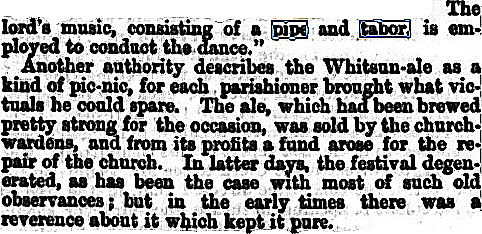 Croydon Guardian and Surrey County Gazette - Saturday 31 May 1879 Croydon Guardian and Surrey County Gazette - Saturday 31 May 1879 |
1884 'Whitsuntime at Woodstock' The Midland Garner 1884 - Page 18 The Midland Garner 1884 - Page 18 |
Bucknell
"The observance of Whitsun Ales was kept up until recent years. … There was dancing on the ground in front of the barn, as many as fifty couples dancing at a time. There were also morris-dancers... accompanied by a musician who carried a pipe and small drum."
Whitsun in 19th century Oxfordshire by Alun Hokins
|
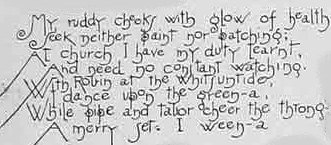 1890's part of a romantic poem from the 1890's part of a romantic poem from the
Illustrated London News, Christmas Edition |
 Roy Dommett's Morris, 2017 Roy Dommett's Morris, 2017 |
1877 The Holy Thorn Bush was supposed to bloom at midnight on the old Christmas Day:  Weston-super-Mare Gazette, and General Advertiser - Saturday 13 January 1877 Weston-super-Mare Gazette, and General Advertiser - Saturday 13 January 1877 |
|
| |
|
| Civic processions |
|
Dunmow Flitch
The Flitch Trials are held every 4 years in Great Dunmow, Essex. They exist to award a flitch of bacon to married
couples from anywhere in the world, if they can satisfy the Judge and Jury of 6 maidens and 6 bachelors that in 'twelvemonth and
a day', they have 'not wisht themselves unmarried again'.
Four musicians were at the front of the procession in 1841, one of
whom was a pipe and tabor player' who played with so much glee that he cannot refrain from dancing to his own music.' Leeds Intelligencer - Saturday 10 April 1841 |
|
 Great Dunmow procession Great Dunmow procession
1832 drawing |
|
1841 Great Dunmow procession 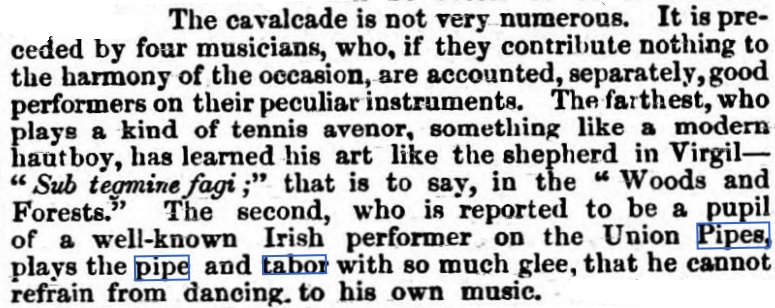 Leeds Intelligencer - Saturday 10 April 1841 Leeds Intelligencer - Saturday 10 April 1841 |
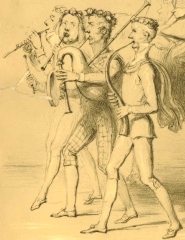 1841 Dunmow Flitch procession 1841 Dunmow Flitch procession
|
In 1855 the taborers were placed near the back of the procession for the ‘The Flitch of Bacon Pageant’: Two pipe and tabor players were 13th in the procession just infront of the flitch. 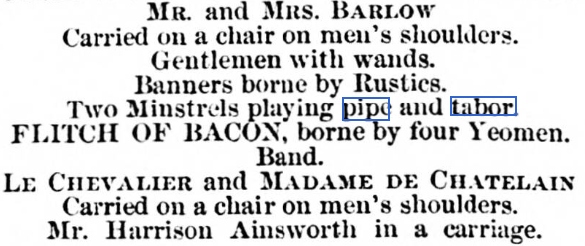 Essex Standard - Friday 20 July 1855 Essex Standard - Friday 20 July 1855 |
|
| |
|
| rush-bearing procession |
|
Wakes Week Lancashire
KEAW YED WAKES FESTIVAL, WESTHOUGHTON, NEAR BOLTON, LANCASHIRE
“The cotton mill and coal town of Westhoughton annually celebrates its Wakes Week Festival… According to Whittle's ‘History of Lancashire’, it is recorded that "... there used to be a grand rush- bearing, which was carried on by the people here … accompanied by a procession of pipe and tabor, and the richest household plate fixed upon a cart filled with rushes, for the church …”
'Yearbook of English Festivals'
by Spicer, Dorothy Gladys, 1972 |
|
meeting and greeting
1842 It appears to be the custom to greet respectable visitors with a procession that includes the pipe and tabor. 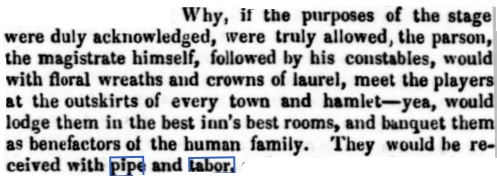 |
|
1879 Political Rhyme - ‘To the Liberal electors of North Norfolk' Durham County Advertiser - Friday 07 February 1879 Durham County Advertiser - Friday 07 February 1879 |
|
1892 In an essay entitled ‘So Respectable’ the pipe and tabor are still remembered as being used to greet honoured folk:  Bridge of Allan Reporter - Saturday 06 February 1892 Bridge of Allan Reporter - Saturday 06 February 1892 |
|
| |
|
1843 Election procession  Bell's Weekly Messenger - Monday 01 May 1843 Bell's Weekly Messenger - Monday 01 May 1843 |
|
| |
|
| Lichfield Bower procession |
|
1819 the pipe and tabor lead the procession. This tradition continued into Victorian times, sometimes with
and sometimes without the pipe and tabor.
1825 Whit Monday at Lichfield.
To the Editor of the Every-Day Book.
Sir,—In the pleasant little city of Lichfield... the annual fair for the exhibition of shows, &c. is held on Whit Monday, and it is the custom on that day for a procession, accompanied with musicians, flags, &c. to be formed, composed of part of the corporation, with its inferior officers, &c. who are joined by several of the best mechanics of the place, each of whom carries a representation in miniature of his separate workshop and mode of trade,.... The procession walks from the guildhall to a high hill in the vicinity of the city, called Greenhill, (but which is now nearly surrounded by houses,) where a temporary booth has been erected, with a small space of ground enclosed at the front with boards. This booth is also decorated with flowers, and hence the fair has derived the appellation of “The Greenhill Bower.” On arriving at this booth, the gates of the enclosed park are opened and the procession enters....."
Hone Everyday Book page 667 |
|
“…There is yet enough left ... to create an association with the times of our merry forefathers. The pipe and tabor are still heard, and the morrice-dancers, with their sticks and bells, and gaudy party-coloured dresses, still display their grotesque antics in our streets….
In 1839 General Dyott wrote: ‘I had the usual visit from the Morrice dancers in their party-coloured robes, but the old musick of tabor and pipe was missing” Evidently other people were also disappointed because the Bower Committee in 1840 agreed ‘to include a tabor and pipe amongst the music’…
The picture in the Illustrated London News of 1850 which had shown the morris men led by a pipe and tabor player, and saying: ‘“Old Taboring Billy” was the last of his race who did duty at the Bower, and he too was gone”
‘The Morris in Lichfield’ by Roy Judge
Folklore 1992: Vol 103 Iss 2 |
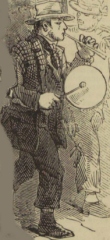 1850 1850 |
1850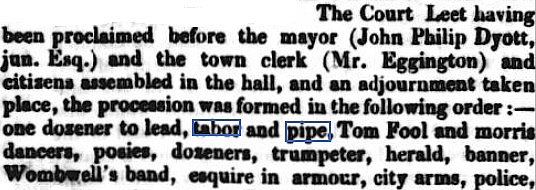 Wolverhampton Chronicle and Staffordshire Advertiser - Wednesday 29 May 1850 Wolverhampton Chronicle and Staffordshire Advertiser - Wednesday 29 May 1850 |
 1850 child player 1850 child player
in procession |
order of procession started with:  Illustrated London News - Saturday 25 May 1850 Illustrated London News - Saturday 25 May 1850 |
|
1877 Lichfield Bower procession  Staffordshire Advertiser - Saturday 26 May 1877 Staffordshire Advertiser - Saturday 26 May 1877 |
| |
| other processions |
1833 Shaftsbury Prize Byzant Gloucestershire Chronicle - Saturday 10 August 1833 Gloucestershire Chronicle - Saturday 10 August 1833 |
|
1889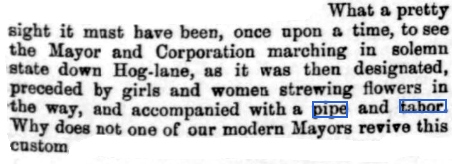 Bucks Herald - Saturday 30 November 1889 Bucks Herald - Saturday 30 November 1889 |
|
1896 in Ripon  Daily Telegraph & Courier (London) - Thursday 20 August 1896 Daily Telegraph & Courier (London) - Thursday 20 August 1896 |
1897 procession
"Jubilee pageant and sale of work at Honington Hall ....
The procession included a pipe and tabor player."
Warwick and Warwickshire Advertiser - Saturday 07 August 1897 |
| |
| Wedding processions |
1840: Works, by Edward Howard, Volume 1 ‘Jack Ashore’, p143 Works, by Edward Howard, Volume 1 ‘Jack Ashore’, p143 |
1843 wedding procession observed in 'Great Cities':  Kentish Mercury - Saturday 04 March 1843 Kentish Mercury - Saturday 04 March 1843 |
1849 At Theatre Royal, Haymarket – play 'The Brigand':  Globe - Thursday 22 March 1849 Globe - Thursday 22 March 1849 |
1862 wedding procession ‘ABOUT SHEIMPINGTON’
“…Here are Jemmy and Jenny Jessamy going to be married at the ivy-grown church. Pipe and tabor,
and " loud bassoon," of course, playing before….Pipe and tabor, loud bassoon and merry train pass
him, and he bows his head very sorrowfully…”
'Accepted addresses'
by George Augustus H.F. Sala |
1891 Sheffield Independent - Saturday 13 June 1891 Sheffield Independent - Saturday 13 June 1891 |
| |
plough Monday |
|
1845 Northampton Mercury - Saturday 11 January 1845 Northampton Mercury - Saturday 11 January 1845 |
1849
" Many of the old games, and masques, and mummings, which were in accordance with the simple habits of our
homely forefathers, have long since passed away…What we have here presented is a faithful portraiture of rural
England only twenty years ago; and there are still, we believe, a few green quiet corners in our island, where
Plough Monday is kept up to the present day....January, with its short days and long nights, though it still comes
as of old, with frost, and snow, and cold, and darkness, brings with it once a year its merry Plough Monday,…
sometimes the old-fashioned pipe and tabor, which have been blown and beaten by the descendants of the same
family, through many generations, are called in to awaken the sleeping echoes of winter. You hear the noisy group
long before they heave into sight along the winding lane
…They knocked at the door—there was no answer. “ Betsy” rattled his box louder than ever, but no one came;
drum, tabor, pipe, and violin thundered and screamed in vain… Gee-ho ! Comc-up!” exclaimed the man who
held the stilts or handles of the plough, and in a moment the deep bright share was into the ground: backwards
and forwards it went, cutting deeper, and the men pulling stronger at every furrow they made, until the whole
lawn at the front of the miser s house lay brown, bare, and ridgy as a newly-ploughed field...."
‘Illustrated London Almanack’ Vol. 5 1849 |
1865  'The Works of Washington Irving: The crayon miscellany'
by Washington Irving 'The Works of Washington Irving: The crayon miscellany'
by Washington Irving |
 1869 plough Monday 1869 plough Monday |
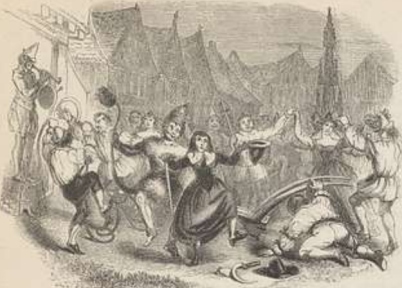 dancing with the plough, an imagined scene dancing with the plough, an imagined scene |
|
| |
| Wassail |
There are two types of wassailing; one when you go door to door around a town and the other is when you go to an orchard to wassail for a good crop of apples, pears or plums. 'waes hael', which means 'good health'.
The Twelfth Night Wassail Bowl
Illustrated London News Jan 5th 1856 |
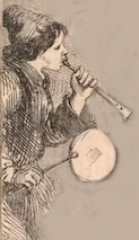 1856 with a bagpiper 1856 with a bagpiper
|
Canu Cwnsela
(Wassail Song)
"Good luck to your labours
Your pipes and your tabors;
But frist tell me, neighbours,
Who be you?" |
Piper's Wallet CHRISTMAS WASSAIL SONG.
"Hark the kirkbelis cheerlie ring
Christinas tide is comin' 0
Let us dance an let us sing,
To tabor, pipe, an drumin' 0."
source 1846 The piper's wallet, supplied with
the harmony of the muses,
in a collection
of original songs composed by two literary gentlemen |
1849 De Merley: A Legend of the Wansbeck in the Olden Time De Merley: A Legend of the Wansbeck in the Olden Time
by William Henry Short |
'Holly Red and Mistletoe' (A Christmas Carol from the Isle of Wight)
Collected / Transcribed P Stone 1890's
“…Heralding the wondrous birth
Hark! The angels singing,
“Goodwill to men and Peace on earth”
Christmas bells are ringing.
Refrain: Forward pipe and tabor go
Voicing harmless folly
Holly red and mistletoe
Mistletoe and holly….” |
| |
| Punch and Judy |
1849 St Giles Fair, Oxford  Oxford University and City Herald - Saturday 08 September 1849 Oxford University and City Herald - Saturday 08 September 1849 |
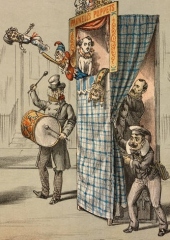 1884 1884 |
1851  GREAT PUBLIC MEETING NELSON EXAMINER AND NEW ZEALAND CHRONICLE, VOLUME IX, 11 JANUARY 1851, PAGE 178 GREAT PUBLIC MEETING NELSON EXAMINER AND NEW ZEALAND CHRONICLE, VOLUME IX, 11 JANUARY 1851, PAGE 178 |
|
| |
| peep show / raree show |
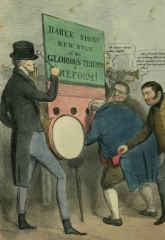 1832 satire 1832 satire |
1847 story 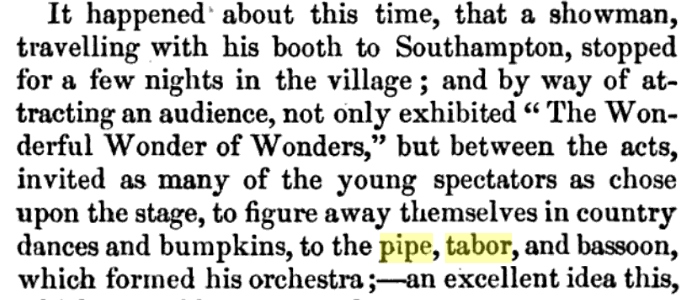 ‘Nights of the round table: or, Stories of aunt Jane’ by Christian Isobel Johnstone page 42 ‘Nights of the round table: or, Stories of aunt Jane’ by Christian Isobel Johnstone page 42 |
1859 newspaper commentary 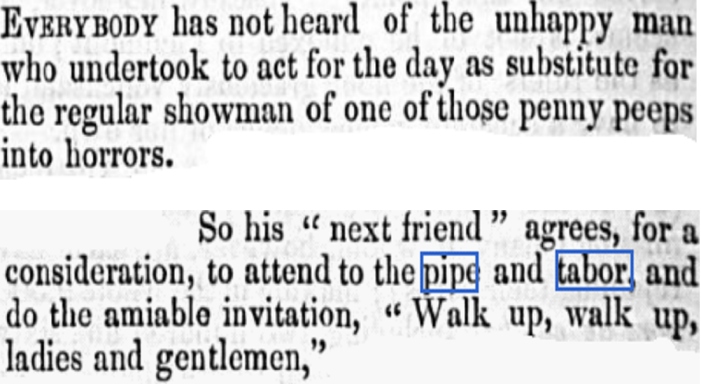 Union - Friday 24 June 1859 Union - Friday 24 June 1859 |
"The Raree-show, or, as it was also called, Peep-show or Gallantry-show. I fancy that this device
was decrepit and well on the way to extinction in the 1850s, for its professors were usually poor
fellows of the shabbiest description. The Raree-show was a box supported on a stick or, if of the
larger variety, on a barrow, in which were placed pictures, sometimes rude paintings, but more
often engravings, which could be viewed through peep-holes on payment of a halfpenny. The
box was often surmounted by the Union Jack and by placards announcing the rarity and beauty
(both highly supposititious) of the pictures within; with perhaps an earnest entreaty to "support
the Fine Arts." Some were lighted at night by a candle. People, chiefly children, were attracted,
sometimes by sound of trumpet, in sufficient numbers to keep the proprietor's soul in his body,
but hardly more. During the Crimean War and Indian Mutiny …custom had spasms of activity,
but after 1860 …pictures grew commoner and cheaper. Then the Raree-show died the death,
at all events in London. Its tableaux were poor, and it was a sorry business. Yet we read of the
arrival of such a show in a village constituting quite an event earlier in the century...."
London and Londoners in the Eighteen-Fifties and Sixties, by Alfred Rosling Bennett, 1924 - Chapter 6 - Street Entertainers |
|
| |
| Christmas |
1864 ”Besides the usual carol singers and hymn singers who went from house to house I recollect we were
always visited by a piper a little before Xmas" The writer added that the instrumental combination of three-holed
pipe and tabor drum was a rare one by that date.”
London, British Architectural Library, Manuscripts and Archives Collection, Sir George Gilbert Scott Papers, Sc GGS/3,
notebook 1,
'Personal & Professional Recollections', f. 27, written 22 January 1864; published in Recollections of Nineteenth-Century Buckinghamshire, p. 18. |
| |
| Cotswold Games |
1878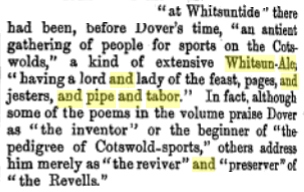 The Athenaeum page 724 The Athenaeum page 724 |
| |
Dancing bear
1885 'Brother Bruin' by Christina Georgina Rossetti
“A dancing Bear grotesque and funny
Earned for his master heaps of money,
Gruff yet good-natured, fond of honey,
And cheerful if the day was sunny.
Past hedge and ditch, past pond and wood
He tramped, and on some common stood;
There cottage children circling gaily,
He in their midmost footed daily.
Pandean pipes and drum and muzzle
Were quite enough his brain to puzzle:… |
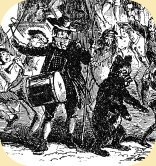 Victorian, with pandean pipes Victorian, with pandean pipes |
|
| |
|
 'The Works of Washington Irving: The crayon miscellany'
by Washington Irving
'The Works of Washington Irving: The crayon miscellany'
by Washington Irving  De Merley: A Legend of the Wansbeck in the Olden Time
De Merley: A Legend of the Wansbeck in the Olden Time The Athenaeum page 724
The Athenaeum page 724 
























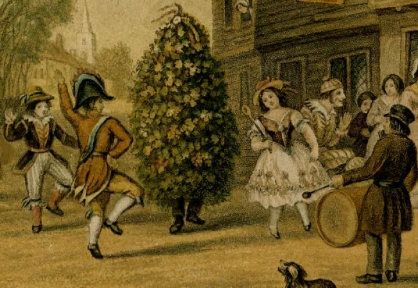
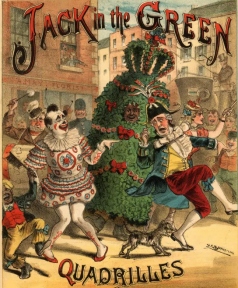




 1832 satire, playing for
1832 satire, playing for

